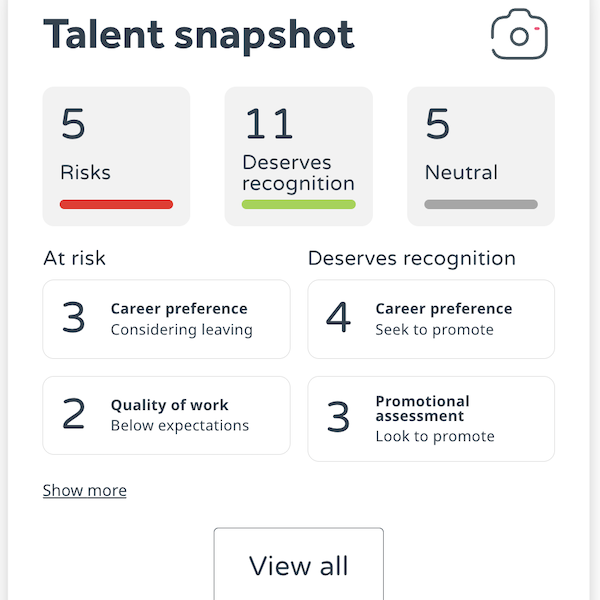According to a 2021 Harvard Business Review study, a staggering 89% of workers said that their work life was getting worse, 85% said that their well-being declined, and 56% said that their job demands had increased. It is sincerely worrying to hear that so few people feel engaged, happy and supported at work.
It is a challenge business needs to address, as poorly engaged employees are simply less productive. Another Deloitte report found that businesses with highly engaged staff were 57% more effective than companies with low engagement scores. They also postured 2.3x greater revenue growth over three years and found people were 87% less likely to leave.
It is clear having engaged employees has a significant impact on the bottom line and it is worth investing time and resources to build a positive company culture. But who leads on this? Increasingly, it is Human Resources (HR) departments.
What is HR’s responsibility for engagement?
HR is the division of a business that is charged with finding, screening, recruiting, and training job applicants, as well as administering employee-benefit programs. Investopedia states “it is tasked with maximising employee productivity and protecting the company from any issues that may arise within the workforce.”
As a business function it has changed dramatically over the last few decades. Former BBC HR director, Valerie Hughes-D’Aeth, told HR Magazine what day-to-day life was like in the average HR, or ‘personnel’, department in the 1990s: “We worked with paper employee files and, if lucky, basic spreadsheets of staff data. I used to hand write HR reports with a ruler, and pen tables of statistics that I calculated manually. …There was little regard for employee wellbeing at work and smoking in offices was the norm.”
In many ways, HR used to be a mainly administrative function. Contact with employees was often limited to staff appraisals, exit interviews, dispute resolutions and disciplinary matters.
Now HR is very much in the frontline of developing company culture and promoting a positive employee experience.
HR and Employee Engagement
Creating a positive company culture is the responsibility of everyone in the senior leadership team and, indeed, every employee in the business. But it has increasingly become HR which develops strategies to raise levels of employee engagement.
HR is now tasked with employee retention, wellbeing and productivity policies. Employee engagement and HR have become natural bedfellows.
So, what does this mean for a HR department?
First and foremost, HR professionals need to become experts and authorities in employee engagement. They must understand the importance of employee engagement, know what methods work effectively, and be able to accurately measure the impact of the strategy.
The starting point is to define the company’s purpose and vision, and make sure it is lived and breathed by the directors, leaders and managers. Only then can the HR department weave its employment engagement magic.
How HR can improve employee engagement
There are several ways in which HR can ensure employees are engaged in their work.
Training
HR usually looks after the training and development for a business, so it is natural that it should also lead on training managers how to engage their team. With the recent acceleration to hybrid and remote working, many managers are finding it difficult to adjust and keep on top of engagement in their teams. HR are in charge of equipping managers with new skills and employee engagement should be high on the training agenda.
Encouraging and Empowering
The HR department can play a pivotal role in building teams and enhancing the employee experience through events and social activities.
It can also lead by empowering employees. HR can spot signs of poor management or overly fussy micromanagement. By advising managers and developing action plans, the HR team can ensure that managers become better delegators and place more trust in their team members to improve employee engagement.
The HR team can help create a culture of recognition and appreciation. As well as encouraging managers to thank the efforts of their team members, the HR department can launch a company-wide incentive scheme or an internal awards programme.
Wellbeing
Employers have a legal duty of care for their employees, and this naturally falls into the remit of the HR function. It is incumbent on a professional HR department to implement policies which benefit the physical and mental health of everyone in the organisation.
Steps that can be taken include encouraging healthy eating and exercise, yoga classes, ensuring people take proper breaks and training mental health first aiders.
The HR department should also be vigilant for signs of people working too many hours or struggling under undue stress. If the HR department does not look out for the wellbeing of the organisation’s people, then there will be greater risk of poor health, the loss of key staff members and absenteeism.
Listening
The only way to truly understand how engaged people are is to listen to their views and thoughts. Unless you ask, how do you know what they are really feeling? The HR department are responsible for ensuring lines of communication are open, and that people feel safe to express their views.
Feedback should be actively encouraged – and acted on. And never underestimate the power of an employee survey. If it asks the right questions, it will reveal the information needed to improve people’s experiences and wellbeing at work.
Measuring
Employee surveys are a useful tool in measuring how engaged people are. In addition, there is a wide selection of analytical tools that can be tapped into. But few things can beat listening to the thoughts of your employees, acting on their feedback and measuring improvements to ensure you’re making a difference.
Employee engagement and HR strategy
Writing on a Chartered Institute of Personnel and Development (CIPD) learning site, Theresa Mayne neatly summarises the challenges in developing HR initiatives for employee engagement: “Employee engagement is a more complex topic than is immediately apparent, because it touches on all aspects of HR.
“Good employee engagement requires HR having a holistic view of the employer-employee contract. HR needs to keep developing employees so that engagement is maintained [but…] HR mustn’t forget or neglect leaders and managers either. Support managers and leaders so that they are engaged with work and are able to engage those reporting to them.”
The great news is that when HR departments create effective employee engagement strategies, their work becomes easier. A happier business means fewer disputes and disciplinary hearings, and exit interviews become a rare occurrence.
If you are a HR professional looking for the right tools to help you make a difference to your employees then look no further. WeThrive has everything you need to create a positively engaged workforce. In just 7 days our employee engagement survey will identify your people’s engagement vulnerabilities and produce instant action plans and recommendations to make rapid improvements. Buy it now for just £995.



